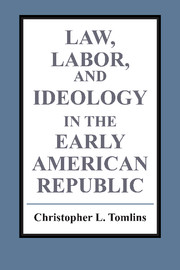Book contents
- Frontmatter
- Contents
- Preface and acknowledgments
- Prologue: two moments of the republic
- PART 1 LAW AND THE FACTS OF AMERICAN LIFE
- 1 Law: the modality of rule
- 2 Police: the pursuit of happiness
- 3 An excess of democracy
- PART 2 LAW, LABOR, AND STATE
- PART 3 LAW, AUTHORITY, AND THE EMPLOYMENT RELATIONSHIP
- An interlude: on law and economy
- PART 4 THE NEW INDUSTRIAL ORDER
- Epilogue: “free Ameriky”
- Index
3 - An excess of democracy
Published online by Cambridge University Press: 05 August 2012
- Frontmatter
- Contents
- Preface and acknowledgments
- Prologue: two moments of the republic
- PART 1 LAW AND THE FACTS OF AMERICAN LIFE
- 1 Law: the modality of rule
- 2 Police: the pursuit of happiness
- 3 An excess of democracy
- PART 2 LAW, LABOR, AND STATE
- PART 3 LAW, AUTHORITY, AND THE EMPLOYMENT RELATIONSHIP
- An interlude: on law and economy
- PART 4 THE NEW INDUSTRIAL ORDER
- Epilogue: “free Ameriky”
- Index
Summary
I am not among those who fear the people. They, and not the rich, are our dependence for continued freedom.
Thomas Jefferson to Samuel Kercheval (12 July 1816)The earliest phase of the new republic, we have seen, was one in which the essentially hierarchical and localized society of prerevolutionary America experienced processes of politicization and democratization. In Robert Wiebe's words, in the 1770s and early 1780s “a multitude of small political units, governmental and quasi-governmental, rushed to fill the vacuum of British authority.” During the 1770s, he continues, “the resistance to Britain and then revolution had unleashed a great range of popular assertions, triggering protests among hitherto passive farmers and townspeople and elevating a number of their spokesmen to office. Occasionally their wartime committees resembled direct government by the people.” This democratic ferment continued to characterize popular participation through much of the 1780s, giving politics a robust “raucous” tone foreign to the elite's polite pretensions.
The content of popular politics was as important as its tone. To meet the expenses of the war, for example, state legislatures showed a distinct preference for currency finance and paper money emissions as opposed to raising loans repayable in hard currency. They occasionally rebelled against levying taxes for debt retirement, relying instead on depreciation.
- Type
- Chapter
- Information
- Law, Labor, and Ideology in the Early American Republic , pp. 60 - 98Publisher: Cambridge University PressPrint publication year: 1993



